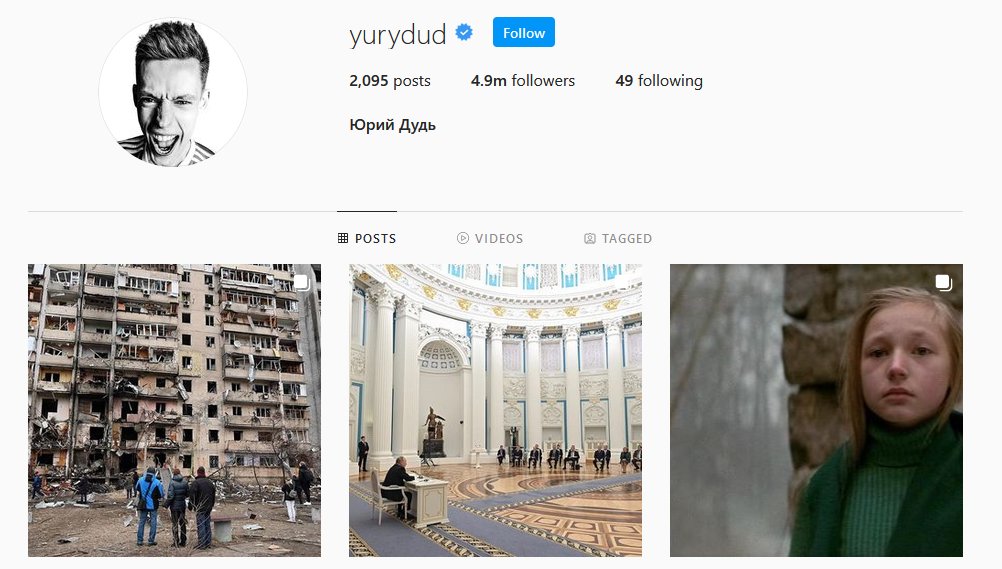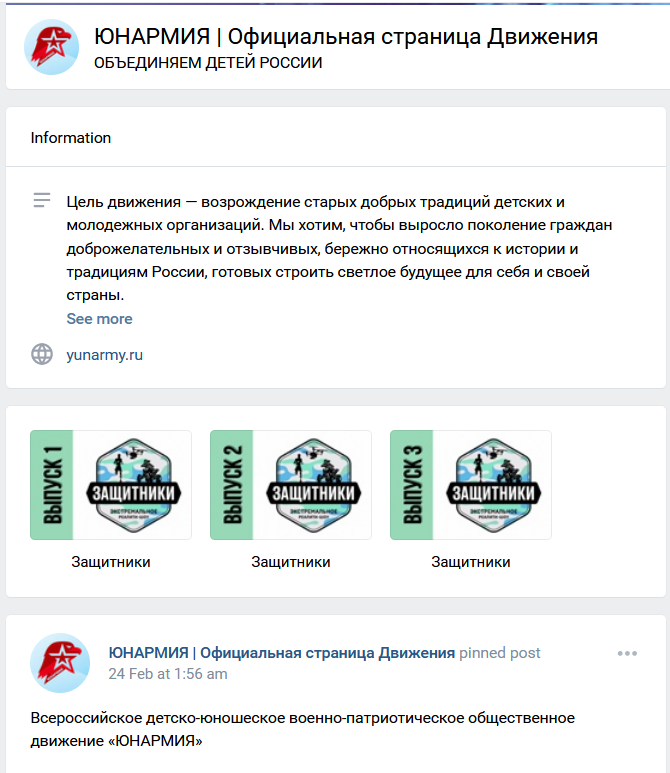Big Thread: After a few more days of war, I've been carefully monitoring Russian social media reaction and production and I'm more convinced than before that Putin's regime has totally overestimated its ability to win a propaganda war.
Russians are being bombarded with very effective Russian-language anti-war propaganda. We're seeing a lot about Zelensky etc. but Russians are widely viewing some HUGE celebrities with big, big follower counts coming out against the war.
You might have read about Yury Dud, the popular Russian blogger, speaking out against the war. 5 million followers, and look at what he's sharing at the top of his Instagram page: strong stuff. 

Here's a voice from Ukraine. Travel YouTuber Anton Ptushkin, a Russian speaker with *5.5 million* subscribers, posted this heartfelt appeal for peace & frank discussion of fears about his family on his IG. Here's a version from YouTube for ease of viewing.
Russians are seeing these narratives, hearing their peers and idols talk to them like normal people and in Russian. They're being shared widely, and the Russian government basically can't stop them.
On the other side, the Russian government is pushing an increasingly impersonal narrative. All we're seeing is images of Putin and his generals in vast meeting rooms, adorned with Rococo panelling, in unidentified places.
The people, where they are addressed, are spoken to as an abstract ("The government is starting a special operation...") rather than as individuals (Ukraine's "We implore you, fellow Russians, to stop attacking our women and children").
State TV political shows, which have good viewing figures, aren't talking about or to people or individuals, who will be the key to winning the propaganda war, either.
Instead, we're still treated to the kinds of bizarre anti-NATO/US Imperialism rants that move public opinion slowly against the enemy. But I don't see them having much effect, in the long run, vs. the much more slick Russian language Ukrainian material.
RU's narrative looks more like WW1 - a detached imperial tsar directing his troops in an abstract war against imperial opposition - than the "all-national" effort of WW2 when, even under Stalin, the population was united in its desire to fight the Nazis. Remember this point.
Turning to Russian social media, a much more threatening narrative for Putin's government might be playing out. I've spent some time reading around Russian language social media to look for what people are saying about the war.
VKontakte, aka "Russian Facebook," is highly controlled by the government. Even on some of the state-supported paramilitary movement pages, the war is conspicuously absent. 

There is no attempt to mobilize the people for a large, drawn-out war, or to "soften up" opinion to prepare for the idea that Russians are going to die.
On ordinary people's VK feeds, I'm seeing three things: (1) Total indifference/absence of mentions of the war is conspicuous almost everywhere you look. Whether people are afraid to post about the war publicly (to some extent possible) or not, we don't know.
(2) Mild criticism of the war, sharing of broken heart emojis, etc. This isn't too widespread, so I don't want to over egg it, but it's important. Anti-war sentiment is there, and you're seeing some of it on the streets.
These sympathetic posts, though, are met with a barrage of aggressive, macho chest thumping ("We'll smash those Western dogs", "LOL bring it on" stuff). Some responses - especially on Instagram - are obviously from bots.
But what's interesting is that I don't see narratives around WW2 being picked up at all. There's a lot of polarized rage, similar to what we see in the West's comments, but no real sense that many of even the most war-hungry Russians are buying into Putin's WW2 cosplay dreams.
If that sentiment isn't there, I don't think - and this is a guess - that people will be ready to make the huge sacrifices that WW2 necessitated. If the Ukraine war is justified by "anti-Nazism," then people aren't picking up the historical connection.
(3) This is probably the most important point. I'm seeing plenty of sharing about bank runs, ATM dashes, inflating prices, and availability of consumer goods. People in the Far East, where food prices are already sky high, aren't quite panicking, but they're not exactly happy.
This is leading to open comparisons to the 1990s: Putin built his brand on stability after the lawlessness and poverty of the 90s, so this is devastating news. This talk was supposed to be long gone (follow @allysonedwards1 for more on the Russian 1990s and militarization).
People aren't ready for their favourite celebrities who speak out against the war - and there are a good number of famous Russians who have done so - to just disappear.
People are not ready for their iPhones to disappear to inflation and sanctions (joke seen in the wild today: "Don't drop your iPhone, because it's going to be your last"). People are not ready for hyper-inflation.
And the government is doing essentially *nothing* to get Russians ready for this. They overplayed a weak hand, the West called their bluff, and now they're in the shit. (Notice this seems to parallel the overconfidence in the military effort - not a coincidence, I'll wager you.)
So what do we have? A stagnant propaganda machine that knows how to create chaos and tear things - esp. the West - down. But it's the propaganda machine of an empire. It's not agile, and it doesn't know how to respond to current events & the strong Ukrainian and Western efforts.
Here's why I think the WW1 comparison is the most important, then: few who would have expected that WW1 would lead to the Russian Revolution 3 years later.
The Russian Empire walked into war without bothering to really prepare its people, who were indifferent to the justification for war, both from the off and increasingly over time. There were divisions, and the Bolsheviks & others manipulated them superbly to seize power.
After a few days of war we can't say that Putin is doomed, but I wonder: without signs that the gvt is taking winning the media war seriously, will tiny cracks around the 1990s, around sacrifice, and around loss turn into gaping fissures in the state's narratives of identity?
• • •
Missing some Tweet in this thread? You can try to
force a refresh









